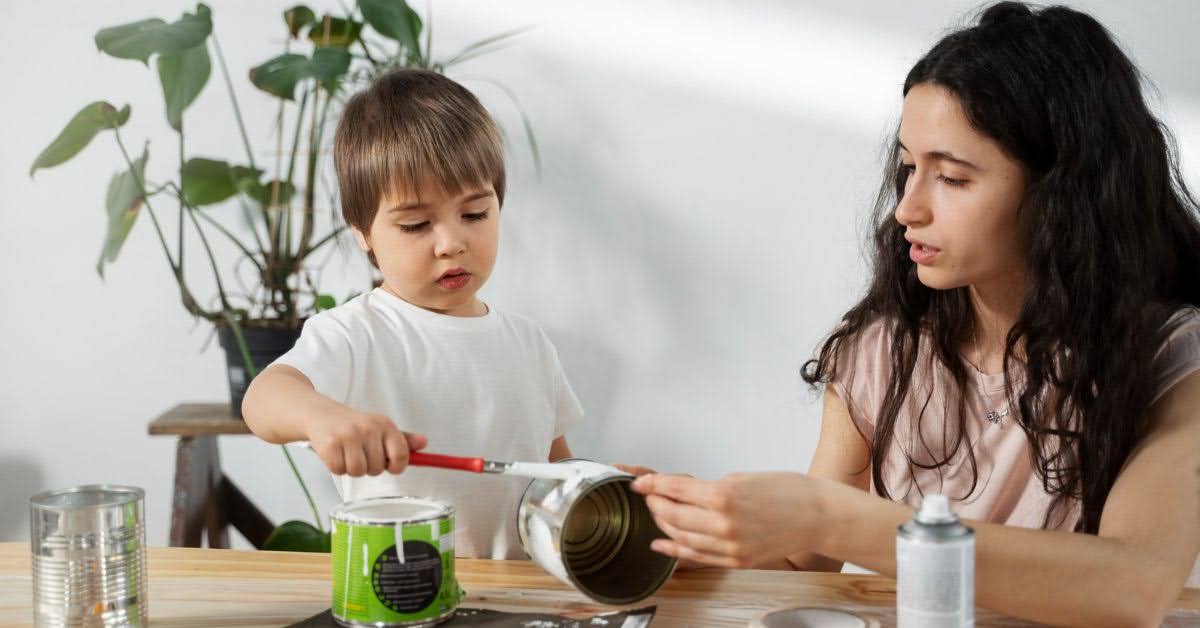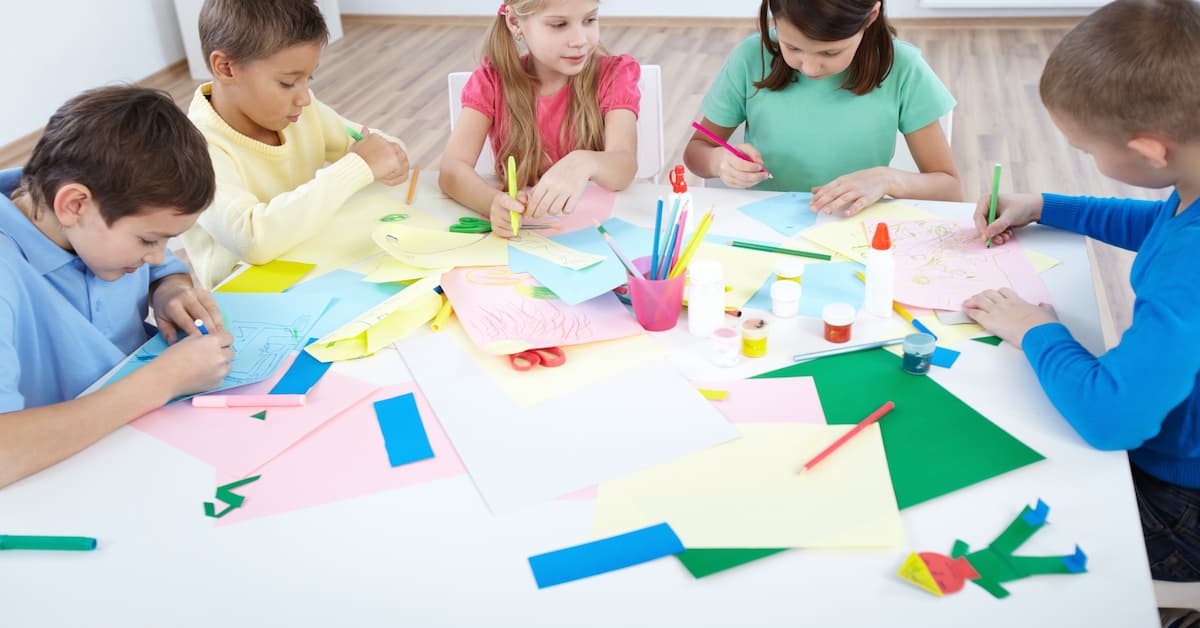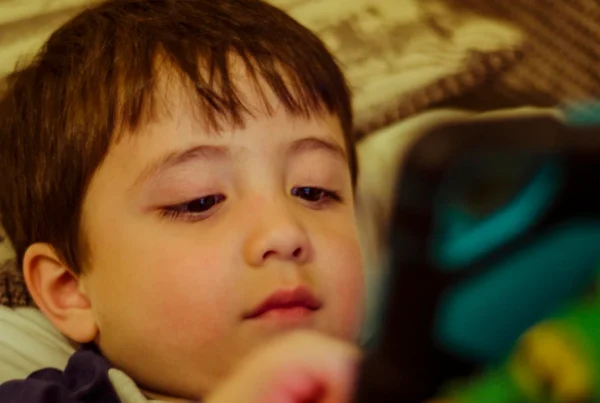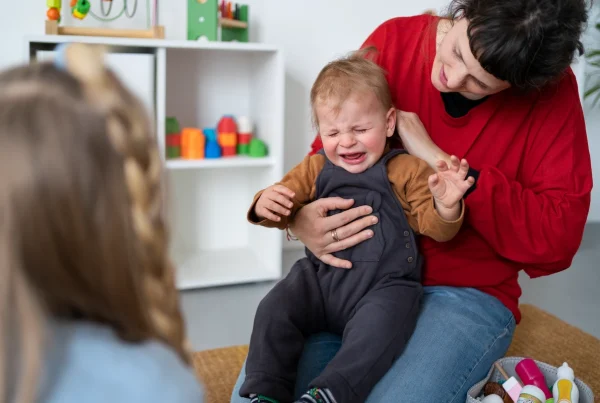Early childhood education lays the groundwork for a child’s growth by building essential skills through structured learning and social interaction at school. These early experiences are important, but learning doesn’t have to stop when the school day ends.
Home-based learning helps parents extend that growth at home through fun, simple activities that support what children learn at school. When home and school work together, children gain consistency, confidence, and a stronger foundation for future success.
The Importance of Early Childhood Education
Investing in early childhood education is essential for holistic growth. A study show that children who participate in structured learning experiences develop better cognitive, social, and emotional skills. These early experiences teach children how to interact with others, solve problems, and think critically. A strong foundation not only equips children academically but also instills a love for learning that lasts a lifetime. One Bible verse from Proverbs 22:6 which says, “…train up a child in the way he should go…”, connects to our belief in nurturing each child in their unique God-given design.
The Benefits of Home-Based Learning Activities as a Complement to School
Engaging in preschool activities at home brings many benefits for both parents and preschoolers. When paired with school-based learning, home-based activities can deepen understanding, support skill reinforcement, and create meaningful family interactions that contribute to a child’s holistic development.
1. Flexibility to Personalize Preschool Lesson Plans
One of the greatest benefits of home-based learning is flexibility. You can easily tailor preschool lesson plans to suit your preschoolers’ unique interests, learning styles, and developmental needs.
For example, if your child loves animals, you can create language practice activities around animal names, sounds, and habitats. This flexibility allows parents to build on topics introduced in school, making learning more relatable and enjoyable for their child.
2. Strengthening the Parent–Child Bond Through Play
Participating in preschool activities at home strengthens the parent–child bond. Simple ideas such as playing building block games, creating letters with popsicle sticks, or counting pom poms help build memories that last a lifetime.
These moments of learning and play also reflect Christian values by modelling the love of Christ in everyday routines, creating a safe and nurturing environment before children step into formal school and meet new friends.
3. Budget-Friendly Resources and Free Preschool Printables
Home-based learning is budget-friendly because it makes use of free preschool printables and everyday household items for activities. For example, printable letters and DIY flashcards can be used to introduce foundational literacy skills, while counting games with pom poms or sorting activities with coloured popsicle sticks help preschoolers develop early math concepts. These creative ideas turn simple resources into effective teaching tools without requiring expensive materials.
4. One-on-One Attention for Individual Growth
At home, preschoolers receive one-on-one attention, allowing them to learn at their own pace without feeling pressured to compare themselves with classmates. This nurturing environment fosters curiosity, confidence, and independence. Whether they are practising their language skills, learning shapes, or exploring new activities, children feel supported and valued, making learning both meaningful and joyful.
5. Creating an Engaging and Spiritually Grounded Learning Environment
With thoughtful planning, parents can transform their home into an engaging preschool classroom filled with purposeful activities. Beyond academic readiness, home-based learning nurtures emotional maturity and spiritual grounding. By integrating Bible verses or songs about God’s love into daily preschool activities, parents prepare their children not just for school but for life anchored in strong values.
Read Also: Nurturing Imagination: Fun and Practical Tips for Parents to Nurture Children’s Imagination
How to Make Preschool Activities Learning Fun and Beneficial?
Creating a supportive learning environment at home is important for your child’s education and helps build a lifelong love for learning. As Christian parents, we are called to teach our children wisdom and truth (Proverbs 22:6), and preparing a good space for preschool activities helps us fulfil this calling.
Here are four simple tips to make home learning fun and effective for preschoolers:
1. Set Up an Engaging Home Learning Space
Creating a dedicated learning space at home helps children focus and understand that learning is a regular part of their day. Choose a quiet, well-lit spot—like a corner of the living room or a section of their bedroom—where your child can return to consistently. A small table and chair work well to establish routine and concentration.
Keep the space simple but engaging. Organize basic materials such as books, crayons, flashcards, or building blocks in boxes or baskets so your child can access them easily.
When children know where things are and feel ownership over their space, they’re more likely to stay engaged and take initiative in learning. With the right setup, home becomes a supportive place where learning feels natural, fun, and meaningful.
2. Create a Routine but Stay Flexible
Start the day with a simple routine to help your child feel secure. You can begin with short learning activities like reading, counting, or matching games, followed by snack time or outdoor play. Keeping a regular flow makes it easier for children to focus and enjoy learning.
3. Encourage Curiosity and Exploration
Support your child’s curiosity by guiding their interests through simple, goal-driven activities. If they enjoy animals, plan a short story time about animal habitats and follow it with a drawing or matching game.
Make exploration part of a routine—like after reading or before outdoor play—so it feels structured. Even a nature walk can become a learning moment when you ask them to count leaves, compare shapes, or describe what they see. This way, exploration stays fun but purposeful.
What Are Some Fun Activities To Do with Preschoolers?
Creating a supportive learning environment at home is important for your child’s education and helps build a lifelong love for learning. As Christian parents, we are called to teach our children wisdom and truth (Proverbs 22:6), and preparing a good space for preschool activities helps us fulfill this calling.
Here are four simple tips to make home learning fun and effective for preschoolers:
1. Set Up an Engaging Home Learning Space
A consistent and engaging learning area helps your child understand that learning is a valued part of their day. Choose a quiet, well-lit spot in your home, such as a corner of the living room or a section of the bedroom. A small table and chair make it feel official while remaining child-friendly.
Organize materials in baskets or bins so kids can easily access:
- Books
- Crayons and coloring sheets
- Flashcards
- Free preschool printables, like tracing pages or letter cards
- Simple puzzles and block games
A clutter-free, cozy space allows preschoolers to feel ownership over their environment. It also helps them focus on activities like alphabet recognition, shapes, numbers, and more. With the right setup, your home becomes a place where preschool learning happens naturally.
2. Build a Simple Routine That Works for You
Having a routine gives your child a sense of stability and purpose. A structured flow supports emotional development and helps young learners know what to expect each day. You might begin with morning prayer and a short Bible story, followed by a learning activity.
A simple preschool-friendly schedule might include:
- Storytime or devotion
- Letter or number recognition with printables
- Snack time
- Outdoor play
- Craft or creative literacy activities
Keep the routine consistent, but stay flexible to allow space for rest or free play when needed. Structure creates rhythm, but freedom keeps things joyful.
3. Let Curiosity Lead with Purposeful Exploration
Preschoolers are naturally curious and full of questions. Use their interests to create fun learning activities that keep their minds engaged and their hearts excited.
For example:
- If your child loves animals, read a short story about habitats, then draw animals together, or use animal matching games
- During outdoor time, ask your child to count the number of leaves they find or name the shapes they see in the clouds
- Talk about God’s creation while exploring the garden or taking a nature walk
Even short moments of discovery can grow important skills like observation, counting, vocabulary, and early literacy.
4. Use Themed Activities and Printables for Engagement
Themes make preschool learning more organized and enjoyable. A weekly or monthly theme helps guide your materials and offers new ways to introduce letters, sounds, and numbers.
Some ideas for themed preschool learning activities include:
- A farm theme with letter cards shaped like animals
- An ocean theme using alphabet puzzles and counting sea creatures
- A weather theme that includes songs, drawing clouds, and identifying shapes
- Bible-themed printables that combine Scripture with coloring or tracing
Look for free preschool printables online to reinforce each theme. These resources are helpful for parents who want easy, effective tools to support daily education at home.
5. Build Literacy Through Daily Activities
Early literacy skills are developed through repetition, fun, and interaction. By weaving literacy into everyday moments, your child will build confidence and excitement about reading and writing.
Try these simple ideas:
- Read aloud every day, even if it’s just one or two books
- Let your child help tell the story by pointing out letters or predicting what happens next
- Create name puzzles using printables with large letters
- Label common household items with word cards to reinforce vocabulary
Over time, your child will begin to recognize letters, sounds, and eventually form simple words, setting a strong foundation for future learning.
6. Encourage Hands-On Learning with Play-Based Activities
Not all preschool education has to happen with books and worksheets. Many valuable skills are learned through movement, creativity, and sensory exploration.
Try incorporating these fun and age-appropriate ideas:
- Sensory bins filled with rice, beans, or soft fabrics for texture play
- Sorting games using buttons or cut-out shapes
- Craft time with glue, scissors, and stickers to build fine motor control
- Bible-based activities such as coloring Scripture pages or singing praise songs
- Simple science experiments like mixing colors or planting seeds
Hands-on learning keeps your child engaged and helps them retain new concepts. Best of all, it feels like play, which makes it even more effective.
7. Keep Christ at the Center of Your Preschool Routine
Faith can be woven into every part of your child’s learning. As Christian parents, we have the joy of sharing God’s truth with our children during these early years.
You can include faith in preschool activities by:
- Starting the day with a Bible verse and prayer
- Reading Christian storybooks during quiet time
- Using printables with Bible themes or verses
- Singing worship songs as part of your morning or clean-up routine
When children learn that God is part of every area of life, including their education, they develop a deep sense of identity and purpose rooted in faith.
 5 Types of Preschool Learning Activities
5 Types of Preschool Learning Activities
Here are several fun and easy activities for preschoolers you can try at home that can help reinforce your child’s skill development.
1. Literacy Activities
One excellent way to promote literacy is through storytime. Reading books together not only enhances vocabulary but also fosters a love for stories. As you read, engage your child by discussing the characters, plot, and moral of the story. Ask open-ended questions to encourage comprehension and critical thinking.
Another fun literacy activity is a letter hunt. You can hide magnetic letters or printable alphabet flashcards around the house and challenge your child to find them. This can be turned into a scavenger hunt, where your child can learn letter recognition while having fun.
2. Math Activities
Math skills can be taught through fun games and activities for kids. Use everyday objects like toys or snacks for counting games. For instance, have your child count the number of blocks or snacks they have.
Shape sorting is another enjoyable activity. Cut out shapes from cardboard and have your child sort them by color or type. This activity reinforces number recognition, categorization, and spatial awareness.
3. Science Activities
The world that God created is full of wonder, and preschool learning activities that focus on science help develop curiosity and appreciation for His creation. Take a walk in nature and collect leaves, twigs, or stones. Then gather around your table to discuss textures, shapes, and colors.
You can also try simple, safe science experiments. One of our favorites is combining baking soda and vinegar to create a fizzy reaction. This introduces the concept of cause and effect and helps your kids observe how different things interact in God’s creation.
4. Art Activities
Creativity is a vital part of early childhood education, and art activities can greatly enhance this. Craft time is an excellent way for children to express themselves. Provide them with paper, crayons, and other art supplies, and encourage them to draw or create their favorite things. This helps develop fine motor skills and fosters imaginative thinking.
Nature art is another engaging activity. After collecting items from nature during a walk, have your child create artwork, such as leaf rubbings or flower collages. This not only promotes creativity but also deepens their connection with the natural world.
5. Sensory Activities
Sensory activities help young children explore textures, sounds, and materials while strengthening hand muscles and focus. Create a sensory bin filled with rice, beans, or water, and let your child dig, scoop, and sort objects using cups or their hands.
Playdough is another great tool. Let your kids roll, press, and mold shapes, letters, or even small stories using cookie cutters or popsicle sticks. These preschool learning activities are perfect for quiet time and even help kids manage big feelings through calming, repetitive motion.
Conclusion
Engaging in home-based learning activities is essential for supporting the development of your preschooler. However, these activities are most impactful when they complement formal early childhood education.
Schools provide essential structure, peer interaction, and guided instruction that work hand-in-hand with the nurturing and flexible environment of home learning. By combining both, parents can offer a well-rounded foundation that fosters confidence, curiosity, and lifelong learning.
Sekolah Pelita Harapan’s reimagined Kindy Program nurtures each child’s unique potential through guided play and integrated STEAM activities, balancing academic readiness with creative exploration.
As a renowned Preschool in Jakarta, SPH strives to recognize and cultivate each child’s individual gifts by assembling a dedicated team of educators who guide children toward a life of meaningful impact.
Our new Kindergarten program follows the Early Years Foundation Stage (EYFS) framework, designed to provide a seamless transition into international programs like the International Baccalaureate Primary Years Programme (PYP) within our IB School curriculum or Cambridge Primary.




 5 Types of Preschool Learning Activities
5 Types of Preschool Learning Activities




